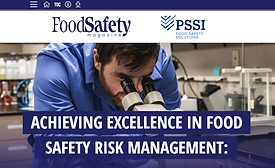Risk Assessment
Harnessing AI to Safeguard Food Safety in the Face of Climate Change
In the wake of escalating concerns over climate change and its profound impact on global food safety and security, innovative solutions are imperative
August 8, 2024
Next-Gen Hygiene: How Do Collaborative Robots Affect Food Safety Programs?
Whenever a new piece of equipment, such as a robot, is incorporated or a process is changed, the food safety plan and the hazard analysis must be reanalyzed
August 8, 2024
Revisiting the Foreign Material Prevention Equation: The Responsibilities of Foodservice
Foodservice executive teams must understand the risk that foreign material (FM) poses to the brand and ensure that the resources for a knowledgeable FM team are a top food safety priority
August 6, 2024
Sponsored Content
eBook | Achieving Excellence in Food Safety Risk Management: Tackling Chemical and Microbiological Threats
June 20, 2024
Never miss the latest news and trends driving the food safety industry
eNewsletter | Website | eMagazine
JOIN TODAY!Copyright ©2025. All Rights Reserved BNP Media.
Design, CMS, Hosting & Web Development :: ePublishing













